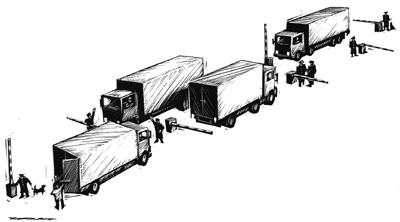|
|
|
|

The WTO: moving forward — Seattle was a drama, not a crisis. The doomsters got it wrong.
by Mike Moore, OECD Observer

David Rooney
Trade used to be unspectacular even boring to most people. Negotiations on tariff-rate quotas, voluntary export restraints and technical barriers to trade did not set too many pulses racing. The World Trade Organisations predecessor, the General Agreement on Tariffs and Trade (GATT), plodded on with the dry work of liberalising world trade amid the silence of public apathy.
How times change! The WTO is now at the heart of a passionate debate about the defining issue of our time: globalisation. We get the same sort of media coverage as sport or national politics. Its either triumph or disaster; victory or defeat; nothing in between is recognised.
To be sure, the nuts and bolts of the multilateral trading systems work has not changed that much. Government negotiators still spend hours holed up haggling over the minutiae of international trade deals. But they now do so under the spotlight of public scrutiny and amid the crossfire of a burgeoning backlash against globalisation.
I welcome the new scrutiny. The WTO does important work and decisions taken in this institution affect the lives of ordinary men and women all over the world. It is right that the WTO be held accountable for its record.
Let me add that we have nothing to hide. On the contrary: we have plenty to be proud of. The multilateral trading system is a powerful force for good in the world. The 15-fold rise in world trade over the past 50 years has probably done more to raise living standards and lift people around the globe out of poverty than any other man-made device. The gains to the world economy from the Uruguay Round alone come to over $240 billion a year. Thats a pretty good return on the $75 million a year that governments chip in to the WTOs budget. The WTO also provides a stable and predictable framework for business by locking in governments commitments to liberalise. And we operate a dispute-settlement system which makes it easier for member governments to resolve their trade disputes without coming to blows.
Perhaps inevitably, though, the WTO has had trouble adapting to the new environment in which it operates. And we are also just beginning to develop responses to new agendas which some people and groups are seeking to have placed before this institution. To some extent the pressures of this new environment were reflected in the failure to launch a new round of world trade negotiations in Seattle last December. And yet, although it was a great disappointment, this was not the first nor probably the last time that trade ministers fail to agree. Old GATT hands will recall the abortive attempt to launch a new round in Geneva in 1982 or the stalemate in Brussels in 1990. Yet Seattle was widely portrayed both in the media and by our critics as a death-knell for the WTO. They turned a drama into a crisis.
Thankfully, the critics have been proved wrong and the doom and gloom stories of six months ago have been shown up for the nonsense they were. The WTO has survived and we are making good progress on a very important negotiating agenda.
First, we have successfully launched major negotiations on agriculture and services. These negotiations are proceeding much better than many expected. Together, the sectors account for over two-thirds of world output. The potential gains from further liberalisation in these areas are huge.
Let me give an example. According to one OECD calculation, consumers and governments in rich countries pay $350 billion per year to support agriculture enough to fly their 41 million dairy cows first class around the world one and a half times. Think of the benefits to everybody if the cost of these support levels were reduced.
Second, we have worked through an important package to help the worlds poorest countries reap greater benefits from the world trading system. This package includes better access to rich-country markets, increased technical assistance, and closer co-operation between the WTO and other global institutions that promote development, notably the World Bank.
Third, we have established a mechanism for dealing with the problems that some developing countries have with implementing some of their commitments from the Uruguay Round. This was a major area of difference at Seattle.
Fourth, we are looking at ways to improve how the WTO works, and in particular how to adjust to having 137 members, all of whom demand respect and their rightful seat at our table.
Last but certainly not least, thirty candidates, more than 1.5 billion people, are lining up to join the WTO. This is a clear vote of confidence in the WTO system and we are doing everything we can to facilitate their entry under the appropriate conditions. In June Georgia became our 137th member and the fourth former Soviet republic to join. Russia itself is actively pursuing accession. China, Croatia and Oman are on track to join the WTO this year. Once they do, the WTO will be much closer to being a truly "World" Trade Organisation.
The overall effect of these efforts is a climate in the WTO which is much better and more encouraging than a year ago. There is lots more to be done and we cant be complacent. But we are institutionally in good shape to move the multilateral trade agenda forward significantly.
Many of our critics would rather the WTO did nothing. They claim we do enough harm as it is. At the same time as we acknowledge and seek to respond seriously to the many issues and banners that our detractors carried to Seattle and more recently Washington, we must never lose sight of our deeper commitment to improving the living standards of all people.